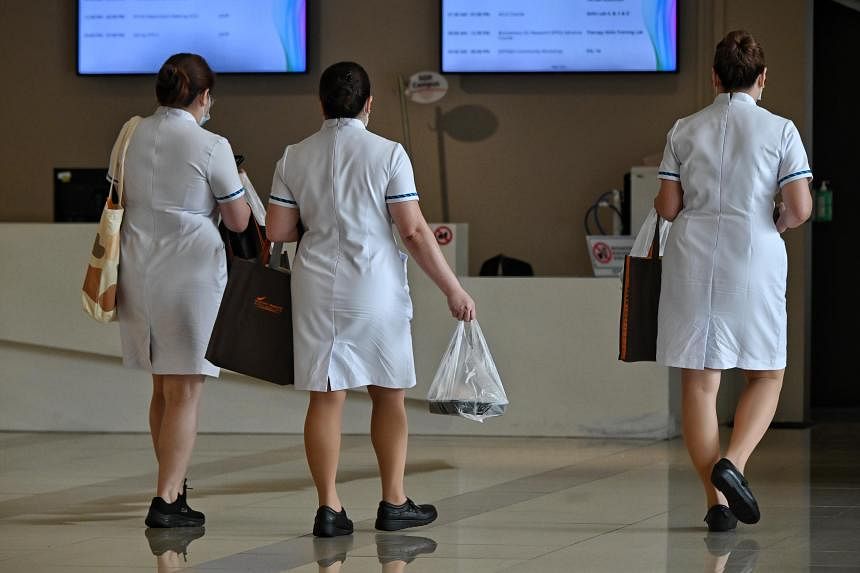SINGAPORE – When Ann (not her real name), a Malaysian, was house-hunting in Singapore in September 2022, she was almost cheated out of $2,000.
The healthcare assistant at a community hospital had successfully applied to work here for the first time.
Healthcare staff quoted in this report spoke to The Straits Times on condition of anonymity because they were not cleared to speak to the media.
Ann was having trouble finding rental lodging, despite looking into almost 15 listings from online portals. She had a budget of $500, which is the monthly housing allowance given to foreign healthcare workers in public healthcare institutions.
The public healthcare clusters had last coordinated an increase in the monthly housing allowance for nurses and support care staff in March 2022.
“The rental rates for one person were $700 to $800, which are too expensive. Some landlords also wanted Mandarin-speaking tenants only. It was so difficult that I almost told the recruiters I didn’t want the job any more,” said Ann, who is Indian.
So when she found a shared room in Yishun for $500 on a Facebook page, she was keen to lock down the unit. A woman who claimed to be the landlord asked her to put down one month’s rent and a refundable $1,500 deposit, which Ann did.
But Ann realised things were amiss when she was not allowed to view the flat when she arrived in Singapore. After her recruiters stepped in and threatened to make a police report, Ann got all her money refunded.
With a friend’s help, she managed to secure a shared room in Woodlands just days before she was due to start work in November.
While incidents like this are uncommon, they can be better prevented when hostel-type accommodations for new foreign workers such as nurses and allied health professionals are rolled out at five sites from the second quarter of 2024, said healthcare recruitment agencies. The accommodations will have the capacity to house an estimated 1,800 occupants.
Mr Rabian Lin, co-founder of healthcare recruitment agency RN Care, said workers will then be able to make more informed choices as they are able to visit potential rental units.
Said Ann: “If I stay in a hostel, I won’t feel so rushed to find a (permanent) place. For me, if I find a room now, I want to view it. I must check properly and speak to the landlords and property agents to make sure they are not scammers.”
In response to queries from ST, the Ministry of Health (MOH) and MOH Holdings (MOHH) said in a joint reply that these accommodation options will be prioritised for new nurses and other healthcare workers for their first two years of service in public healthcare institutions.
“This will give them greater certainty and timeliness around housing arrangements upon their arrival in Singapore,” they said.
Mr Jordache Keith, managing director of healthcare recruitment agency People360 Services, said the upcoming hostels will help streamline and expedite the process of onboarding for new foreign workers.
Singapore is expected to employ almost 4,000 new nurses by the end of the year, with about 60 per cent of them being foreigners. The hiring drive is to make up for the slowdown in foreign nurse recruitment due to Covid-19 border curbs during the pandemic and ease the current manpower crunch.
Foreign nurses are recruited from countries such as the Philippines, Malaysia, Myanmar, India and China. Singapore’s healthcare sector brings them in using the Employment Pass or S Pass.
The recruits need to provide a registered residential address in Singapore before their work pass can be issued. And recruitment agencies ensure these foreigners have a proper tenancy agreement before they come into Singapore, said Mr Keith.
“It is difficult for (foreign healthcare workers) to find housing, and that is one of the major delay points in bringing them into Singapore. It is like apples on a tree, if you can pluck them, but you can’t bring them in, the healthcare system is still stressed,” said Mr Keith, whose agency is expected to bring in about 1,000 foreign nurses in 2023.
Foreign healthcare workers have to source their own housing, and the agencies recommend property agents to them. They also often tap Facebook pages that advertise room rentals, or use platforms such as PropertyGuru or Carousell.
But the agencies said high rents and strong demand following the pandemic have limited the housing options here. New foreign healthcare workers can take anywhere from two weeks to three months to secure rental accommodation. Before the pandemic, it took a week to a month, they added.
Mr Keith added: “What used to be $800 for a shared room for two people has since increased to $1,200 to $1,400.
“Some nurses are also choosy, they want locations closer to their workplaces and to be able to cook... Another challenge is that while we are attracting nurses of different nationalities, some landlords do not want tenants of certain races.”
He added: “There is a global demand for nurses and they have applications for different countries ongoing.
“If they are having an issue with finding housing in Singapore, they tend to jump ship... to institutions in Australia or the Middle East that provide accommodation.”
Mr Keith said such instances make up 3 per cent to 5 per cent of applications a year.
Roger, a registered nurse who has been working for less than two years at the National University Hospital, took three months to find a room in Woodlands, which he shares with another person.
His monthly rent is $600, and utilities set him back another $100.
“I waited so long to find this price, and I got it after much negotiation, like agreeing to a two-year lease,” he said, adding that he is paid about $3,200 a month including accommodation and shift allowances.
To save money, he cooks his own meals and stays home most of the time.
Details on the cost of the hostel-type accommodations, which are expected to house two occupants in a bedroom, are not out yet, but Roger said a rate of $250 a month would be reasonable.
“That is because there could be restrictions, and visitors like family members or partners might not be allowed,” he added.
Another benefit of the hostels is that they will help foreign healthcare workers build a support system and assimilate to Singapore better.
“The facilities also provide opportunities for the new healthcare workers to develop friendships for mutual support in their initial years of working in Singapore, and build familiarity with the local context before they transit to renting from the market,” said MOH and MOHH.
RN Care’s Mr Lin agreed, saying: “If they don’t have friends who come to Singapore together, they can make friends. They can also identify who they might be comfortable with and rent a room together eventually.”
Esther, a Filipina working as an enrolled nurse at Tan Tock Seng Hospital, concurred that being in a hostel environment would make it easier to get help and advice.
She said: “Some of my friends find it difficult to adjust, especially if they don’t know Singapore’s culture and environment. So being in a hostel is good, because newbies can be guided.”
The 34-year-old said the language barrier posed the biggest challenge for her in adjusting to Singapore.
“Older Chinese patients speak dialects such as Cantonese and Hokkien, so I had to learn from family members and colleagues,” she added.


